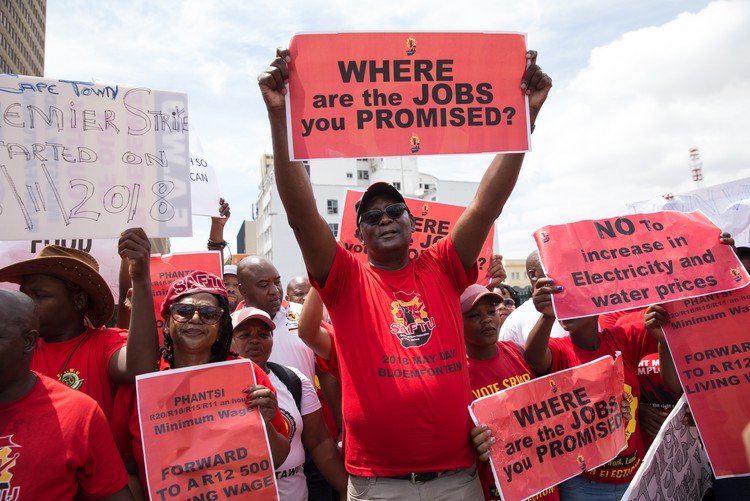
General secretary of SAFTU Zwelinzima Vavi joined the march to Parliament ahead of the 2019 budget speech. Photo: Ashraf Hendricks
20 February 2019
Ahead of the budget speech, Minister of Finance Tito Mboweni signed a memorandum and addressed hundreds of marchers from various working class organisations that had come to Parliament under the banner of the South African Federation of Trade Unions (SAFTU).
Mboweni told the protesters there was a plan to support first-time home-buyers, additional money for police and education.
People had marched from Keizersgracht, singing songs and wearing red regalia. They held posters which read: “Where are the jobs promised after 25 years of democracy?”; “Premier Foods still use ‘K’ word”; “Tax the rich so the poor can live”.
Organisations that supported the march included the South African Public Service Union (SAPSU), General Industries Workers Union of South Africa (GIWUSA), Housing Assembly, the Commercial, Stevedoring, Agricultural and Allied Workers Union (CSAAWU), and The Food and Allied Workers Union (FAWU).
Young people participating in the march told GroundUp were concerned about being unemployed and their living conditions. They said they wanted wanted decent housing, water, sanitation, safe communities, a Basic Income Grant (BIG), free education and free health care, and affordable, safe public transport.
Andries Miggets from George said it was the housing problems experienced in his community that motivated him to join the march. He said RDP houses are very small and of poor quality.
A woman who identified herself only as Nosipho of Gugulethu said: “I am here to make my voice heard before the Minister announces his budget. The government is treating youth like second class citizens, as if we are not South Africans. The budget is not for us the unemployed youths. … They promise to create jobs and they never [do]. Now they switch off electricity for us … But it’s not us who stole money from Eskom.”